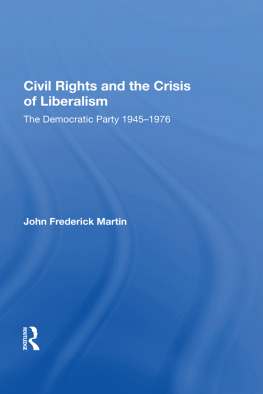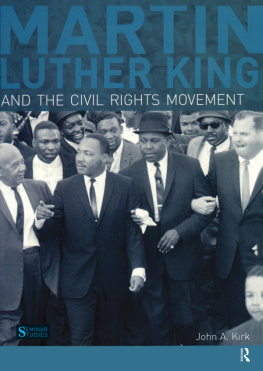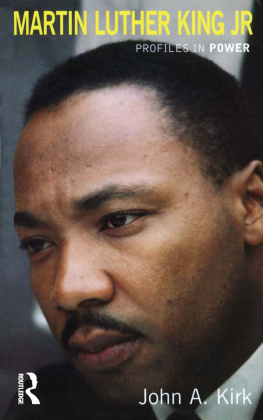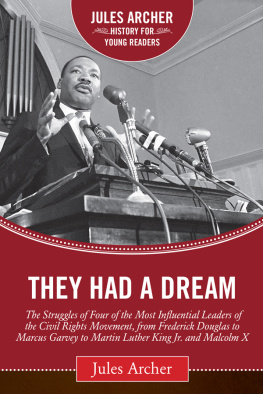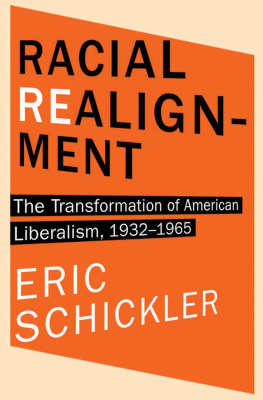Civil Rights and the Crisis of Liberalism
About the Book and Author
Civil Rights and the Crisis of Liberalism: The Democratic Party, 19451976
John Frederick Martin
This book is an interpretation of our recent political past. It offers an explanation of the rise and decline of postwar liberalism, a creed that was vitally concerned with civil rights. Partly because of such special concern, liberalism inspired in many a daring vision of social justice and, by the end of the 1960s, inspired in many more a reaction of loathing and contempt.
To explain the rise of this ideology, John Frederick Martin has drawn from numerous archives and interviews and assessed the contributions of Truman, Stevenson, Kefauver, Harriman, Kennedy, and Johnson. To explain its decline, he has analyzed the reaction to the liberals governmentthe sentiments aroused by busing, affirmative action, Model Cities, and the militance of blacks, Democrats, and white ethnics. Though varying in their intent, these responses shared a dislike of the liberals treatment of minorities and a dread of government powera dread made stronger by the antiwar movement and the Watergate scandaland thereby discredited the very ends and means of the liberal program.
By the early 1970s, Martin argues, it was no surprise that a politics of consumerismpivoting on the rights of the average citizen, not of the deprived citizen, and eschewing government powerhad replaced the liberal ideology.
Placing this narrative in a larger context, Martin explains the importance of the race issue in previous liberal movements and composes an interpretation of the whole of American liberalism as well as of its latest stage and the Democrats recent ordeal.
John Frederick Martin, a graduate of Harvard College, is a Ph.D. candidate in history at Harvard, where for the last four years he has been a Teaching Fellow.
First published 1979 by Westview Press
Published 2018 by Routledge
52 Vanderbilt Avenue, New York, NY 10017
2 Park Square, Milton Park, Abingdon, Oxon OX14 4RN
Routledge is an imprint of the Taylor & Francis Group, an informa business
Copyright 1979 by John Frederick Martin
All rights reserved. No part of this book may be reprinted or reproduced or utilised in any form or by any electronic, mechanical, or other means, now known or hereafter invented, including photocopying and recording, or in any information storage or retrieval system, without permission in writing from the publishers.
Notice:
Product or corporate names may be trademarks or registered trademarks, and are used only for identification and explanation without intent to infringe.
Library of Congress Cataloging in Publication Data
Martin, John Frederick.
Civil rights and the crisis of liberalism.
Includes bibliographical references and index.
1. Democratic Party.2. LiberalismUnited States.3. Civil rightsUnited States.
4. United StatesPolitics and government1945- I. Title.
JK2316.M27329.379-10886
ISBN 0-89158-454-4
ISBN 13: 978-0-367-02112-2 (hbk)
To my parents,
John Bartlow and Frances Rose Martin
In the course of this research I incurred many debts. At the Kennedy Library I am grateful to the director, Dan Fenn, and to the staff, principally Allan Goodrich. At the University of Tennessee I am grateful, for his friendly and patient assistance, to John Dobson, Librarian of the Special Collections.
For permission to publish quotations from their fathers private papers, I am indebted to Senator Adlai E. Stevenson of Illinois and to Dr. D. E. Kefauver of Tennessee. For permission to publish quotations from the notes of F. Joseph Donohue (aide to Senator Kefauver), I am indebted to Mrs. F. Joseph Donohue. I am indebted also to Doubleday, and to Samuel Vaughan, Publisher, for permission to publish three quotations excerpted from Adlai Stevenson and the World , by John Bartlow Martin, 1977. To these people I wish to express my thanks.
For permission to quote from their own correspondence, I am indebted to Jonathan Daniels, Arthur M. Schlesinger, Jr., and Hermon Dunlap Smith. I am most grateful to them for permitting this invasion of their privacy, especially to Arthur Schlesinger, who also allowed me to quote excerpts from his diary.
Others have provided me with invaluable information. James Rowe gave me a copy of the strategy paper he wrote in 1947, when he and others were preparing the upcoming presidential campaign of Harry Truman. Joseph Rauh gave me a copy of the unpublished memoir he has written of his experiences in a series of Democratic National Conventions from 1948 to 1968. These documents were of inestimable importance to me. Moreover, both Rowe and Rauh read and criticized portions of the manuscript and answered my queries in interviews and correspondence. I am deeply grateful to them; though I should emphasize that neither they nor the others who helped me bear any responsibility for the views expressed in this book. Nor do they necessarily share these views; sometimes they have told me they do not. Others have kindly answered my request for help: Congressman John Brademas, Jonathan Daniels, Robert J. Donovan, Judge Samuel Gold, and Newton Minow. Douglas Costle gave me a copy of the study he made of the Model Cities program. And on several occasions, Milton and Lisa Gwirtzman gave me valuable advice and encouragement. To all these people, I am indebted, and I must express my profound gratitude.
In a book of this kind, on events so recent, interviews are indispensable. Those I interviewed, in the spring and fall of 1976, gave generously of their time: Derrick Cephas, witness to the Cambridge, Maryland, riot of 1967; Douglas Costle, Model Cities expert (now administrator of the Environmental Protection Agency); Richard Goodwin, Kennedy and Johnson speechwriter; Milton Gwirtzman, aide to Robert F. Kennedy; John Harwell, former official of the Urban League, Chicago; Kathy Hwang, Office of Civil Rights, Boston; Melvin King, representative to the Massachusetts legislature; James OHara, congressman from Michigan; Arthur Okun, chairman of the Council of Economic Advisers under Johnson; Cortney Pace, administrative assistant to Senator James Eastland; Elvira Palladino, cofounder of the antibusing group, Restore Our Alienated Rights; Joseph Rauh, cofounder of the Americans for Democratic Action and counsel to the UAW and Leadership Conference on Civil Rights-, James Rowe, aide to Roosevelt, Truman, Harriman, Johnson, and Humphrey; Herman Talmadge, senator from Georgia; Ted Van Dyk, aide to Humphrey; Robert C. Wood, under secretary of HUD and urban specialist for Johnson. These people cleared up many matters for me. I am grateful to them all.
The Mark DeWolfe Howe Fund of Harvard Law School supported me while I finished the book; to it and to its administrators I owe my thanks. At Harvard my work was also made easier by the help of the History Department and of Mather House, and by the kindness of Bernard Bailyn, John Clive, Frank Freidel, and F. Skiddy von Stade.
I wish also to express my thanks to Lynne Rienner, Executive Editor of Westview Press, who for the past several months has been most helpful and encouraging; and to Herb and Marilyn Ruben, who read an early version of the manuscript and gave me valuable advice.
Marianne and Franz Winkler have shown me unending kindness and encouragement while I worked on this book. I have also had the benefit of the advice and friendship of Dorothy Olding of Harold Ober Associates. Robert Bauer, Stephen Schuker, and Daniela Winkler each read the book and gave me their penetrating criticism, as well as their sustaining friendship. To these people I owe a special word of thanks.

